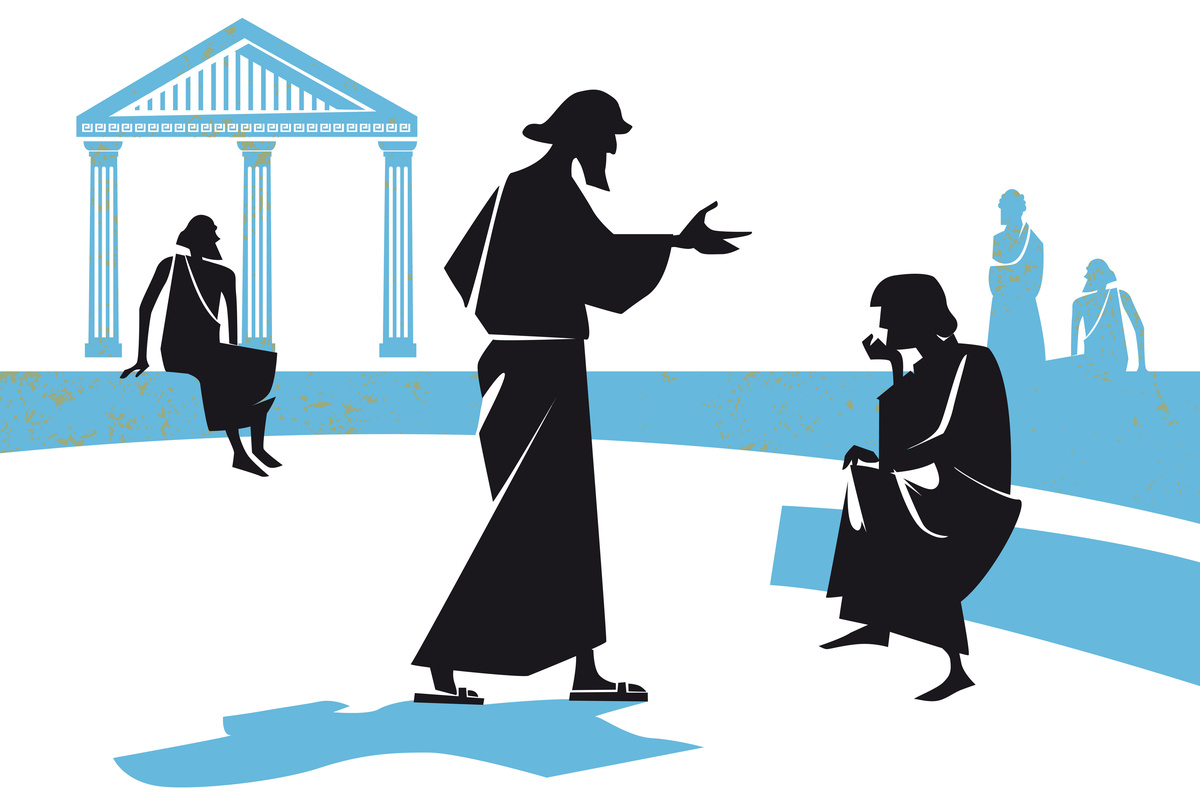Table of contents
General meaning of the Zenon Effect

The Zenon effect is the name given to the resistance to change that systems present while someone observes them. It received its name in reference to the Greek philosopher Zenon of Eleia, who took the first steps in the study of this phenomenon, which currently receives attention from Quantum Physics.
In the course of this article, we will look in more detail at what the Zenon Effect consists of, the consequences of it in our lives, its relationship to anxiety, how it can affect your life, and why letting go is the best response to the Zenon Effect.
The Zenon effect, Zenon of Eleia and the paradox of the motionless arrow

Zenon, an ancient Greek philosopher, realized that, strange as it may seem, the observer of an object or phenomenon exerts influence on it. This influence can freeze the object or phenomenon in a specific state.
This knowledge, which may seem of little practical use, is closely related to the question of the posture we must adopt in order to enjoy happiness.
To explain his ideas about change and how it can be inhibited, Zenon created an interesting mental experiment, with which we will become familiar later, because it helps illustrate the negative effects of anxiety and obsessive worry.
Zenon Effect or Quantum Zeno Effect
The Zenon Effect is a phenomenon in which, even if all the conditions for a system to undergo a change of state have been met, it is delayed or even prevented by the presence of an observer. The simple act of observing the system already exerts influence on it.
The origins of this idea are found in the ideas of Zenon (also called Zeno) of Eleia. More recently, with the advent of Quantum Physics, it was realized that the Zenon Effect is a phenomenon of quantum nature, that is, related to subatomic particles, smaller than the atom.
Because of the relationships between the Zenon Effect and Quantum Physics, it is sometimes called the Quantum Zeno Effect.
Research has confirmed that the uninterrupted observation of a radioactive element atom prevents nuclear decay (transmutation of an element atom into another, more stable atom, accompanied by the emission of radiation), which would be natural under the conditions. The presence of an observer prevents the transition between states of the object observed, as if freezing the situation.
Due to the Zenon Effect, the mental pressure we create when we obsessively worry about what we want, like paying off a debt, getting a job, obtaining an object, interrupts the natural flow of events that would lead to the realization of those aspirations.
Zeno of Eleia
Zenon was a pre-Socratic philosopher, that is, one of the philosophers of the Greek world whose work preceded that of Socrates. He was born in the fifth century B.C. in Eleia, a city in Magna Grecia, a region of the Italian Peninsula that was populated by Greek colonists.
Although Aristotle attributed to Zenon the creation of dialectics, an important method of philosophical discussion, he is best known for the mental experiments he devised in defense of the system of his countryman Parmenides, who considered change and motion appearances.
As we have seen, Zenon argued that the observer exerts influence on what he observes and can delay, inhibit, or prevent its change of state.
The release
Within the framework of discussing the Zenon Effect and how to avoid it, we can understand letting go as the practice of an internalized, existential detachment.
It's not about passivity or inactivity, on the contrary: take whatever steps you can to achieve what you want. You and the Universe must work hand in hand. What you must avoid is obsessive concentration on the subject.
Attachment to our will activates the Zenon Effect, which hinders the process of manifestation. In contrast, the more we are able to let go of what we want, the better results we will get because the more freely we allow life to flow.
Release while surrendering
Perhaps the best way to understand letting go is to consider it as a posture of unconditional surrender of the ego of those who practice it before life and its wisdom. It is the trust in the capacity that life has, in the course of its natural flow, to grant to each individual what suits him or her.
Relationship of the release to the Zenon Effect
As explained above, attachment to a desire gives rise to the Zenon Effect, which hinders, delays or prevents the transition between states of reality that is necessary for it to materialize. Letting go, on the other hand, allows life to flow in a way that naturally and inevitably brings to each person what they are meant to receive.
Paradox of the motionless arrow
One of the mental experiments Zenon proposed in order to defend Parmenides' ideas helps us understand the Zenon Effect. Imagine observing an arrow in full flight. At each moment of observation, it is at a specific point in its trajectory.
From your point of view as an observer, it is as if, at the moment you observe it, it is motionless at that point. To make it easier to understand, let's update the experiment: suppose you have a camera with you that requires a minimum exposure time to take pictures. You take pictures of the arrow in your path and develop them. How is the arrow in each picture/instance? Motionless, right?
Something similar happens in relation to our goals when we obsessively focus on them or repeatedly shift our attention to them: we immobilize the flow of events that could lead us to achieve them.
Parallel to Doctor Who
The science fiction television series Doctor Who follows the adventures through time and space of the title character, a heroic alien. Among his antagonists are the Weeping Angels, beings who resemble gruesome stone statues.
No one ever sees the Weeping Angels in motion, for while they are being watched, they are "quantically trapped" and remain motionless like the statues they appear to be. However, when no one is watching them, they move quickly and silently to attack their victims.
The characteristics of the Weeping Angels, of course, were imagined as a source of dramatic tension, but we can draw a parallel between these fictional beings and the reality of the Zenon Effect: the presence of an observer freezes something in a state or situation.
The Zenon effect, anxiety and negative consequences

As we will see, the existence of the Zenon Effect is related to anxiety and can have negative consequences for our lives if we lack confidence and do not know how to practice detachment.
The relationship between the Zenon Effect and anxiety
Doubt and anxiety cause us to direct our attention to the realization of what we want. This activates the Zenon Effect and interrupts the process of desire fulfillment. From the above, it is not difficult to conclude that trusting (the opposite of doubting) in the wisdom of life and letting go (the opposite of clinging) are essential behaviors if we are to achieve success.
The impact of the Zenon Effect on the life of the anxious
In addition to causing stagnation in his life, the Zenon Effect can also leave the anxious person frustrated, who realizes that he never (or rarely and at great cost) reaches his goals.
This frustration feeds anxiety, which strengthens the Zenon Effect, the effects of which frustrate the anxious person even more and intensify their anxiety. Thus a vicious circle of anxiety, failure, frustration, and more anxiety is formed.
How anxiety interferes with the manifestation of desire
We already know that anxiety is directly linked to the Zenon Effect, which delays or paralyzes the process of manifesting desire in reality. So what to do? Chances are you've heard the phrase "Let it go!" or the same idea in a different formulation, and there's good reason to think that way.
Remember that the more anxious you are, the more mental pressure you are putting on reality and the more you are unconsciously doing to stop the flow of events and freeze the situation in the current state, in which you have not yet realized your goal.
The negative consequences of the Zenon Effect
In addition to paralyzing the manifestation of your desires, the Zenon Effect can predispose you to various unproductive or harmful behaviors, such as procrastinating on important tasks and inaction, leaving it up to others to take the initiative to accomplish things you are interested in.
Combine a proactive attitude, of doing what is within your reach to get the results you want, with the confidence that what you want is already yours and that this fact will manifest itself at some point.
The best way to react to the impacts of the Zenon Effect
The best way to react to the impacts of the Zenon Effect is by practicing trust in life and detachment, letting go. Believe that life knows what it is doing and will, in due time, bring you what you should receive without you needing to distress yourself.
It is important, however, to understand that it is not a matter of pretending detachment. The energies linked to quantum phenomena such as the Zenon Effect are sensitive to our emotions and our thoughts. For this reason, detachment must be interiorized, to be a natural and instantaneous reaction to desire.
How the Zenon Effect can change your life

The Zenon Effect may be putting obstacles in the way of the success of your initiatives and jeopardizing your efforts. However, being aware of this allows you to change your posture, adopting one that projects more positive vibratory patterns that are more conducive to your success.
The pursuit of happiness
According to Osho, "the anxious search for happiness is what makes us unhappy". The more obsessively we worry, the more we put obstacles to the realization of our plans, and the more frantically we pursue happiness, the more it moves away from us.
We can think of happiness as a slippery object that, the more we squeeze it to hold on to it, the more prone it is to slip out of our hands. Since our frantic efforts and obsessive worry make it difficult to obtain happiness, it is important that we trust and let go.
Instead of taking the things you want as conditions for happiness, believe that you will get them and enjoy happiness permanently, not just after you get something. Instead of making happiness an end point, make it your path.
Balance, serenity, patience and enthusiasm
Balance, serenity, patience and enthusiasm are some of the qualities necessary for the successful completion of almost any project. In addition, they have energetic properties that attract prosperity.
Cultivate these qualities to combine them with trust in the wisdom of the Universe and gratitude for its generosity.
The dreams
Be aware of what you want, visualize yourself enjoying it and then let go. Believe that you deserve to have your dreams come true and that it will happen in due time. Always be grateful for what you have achieved and what you will achieve.
Quantum Physics and spirituality

Quantum Physics has changed our understanding of matter and energy and, consequently, has given us a new vision of our reality that transcends the physical world. This vision, which is more complete than the one we had, is linked to spirituality and the awakening of our consciousnesses. Read this article to understand why.
Quantum Physics
Quantum Physics studies the nature and behavior of particles smaller than the atom, called subatomic particles, among which are photons, electrons, protons and neutrons. Its name comes from the Latin word "quantum", which has the meaning of "quantity".
The name quantum was adopted to name packages of energy linked to the emission of electromagnetic waves among other phenomena that, before Quantum Physics, had no explanation. Among the great names of science that contributed to the emergence and development of Quantum Physics can be mentioned Niels Bohr, Werner Heisenberg and Max Planck.
Energy
One of the great insights that Quantum Physics brought to our understanding of the Universe was the realization that the atom is condensed energy and matter, unlike what appearances make us think, is not something solid. Everything that exists, including ourselves, is energy.
This perception, which transcends the physical world and searches for the essence of the laws that regulate the phenomena that happen in the Universe, connects Quantum Physics to spirituality and, through it, to the awakening of consciousness.
One of the pioneers in studying the relationship between the discoveries of Quantum Physics and spirituality is the Austrian physicist Fritjof Capra, author of the book The Tao of Physics.
Awakening of consciousness
All of us, some more than others, have wondered about the origins of the universe and life and the purpose of existence. Over the millennia, different cultures and religious and philosophical traditions have tried to answer the questions that these themes inspire.
According to Quantum Physics, our thoughts exist as energetic patterns whose vibrations have a negative or positive effect on the reality in which we live.
We can unconsciously project negative emotions and thoughts, with unfavorable results to our plans. We are also capable of projecting positive emotions and thoughts, in order to favor the realization of our desires.
Lighting
Science teaches us to use the phenomena that we can control, and spirituality comforts us in the face of phenomena that we cannot dominate. Both, each in its own domain and with its own methodology, converge in their conclusions about reality.
This convergence offers us a fuller idea of the universe, our place in it and what we can become, putting us on the path to enlightenment.
Could the Zenon Effect be holding me back from achieving my goals?

Whether it's predisposing you to harmful behaviors, or delaying or preventing the changes that would lead to the realization of your desires, it's likely that the Zenon Effect is preventing you from achieving your goals.
The good news is that by being aware of the consequences that the Zenon Effect can have on your life, you can adopt a stance that is more conducive to your success. So, be sure to take a proactive attitude and let go, just as taught in the article.

